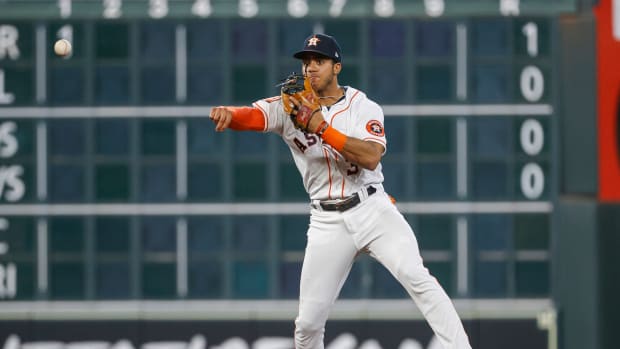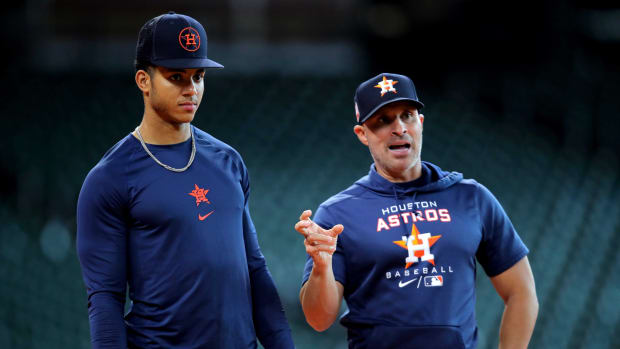Welcome to The Opener, where every weekday morning during the regular season you’ll get a fresh, topical story to start your day from one of SI.com’s MLB writers.
It didn’t take long for Jeremy Peña to be comfortable against major-league competition.
One day after a forgettable 0-for-4 effort at the plate in his MLB debut, the Astros shortstop battered the Angels pitching staff on April 8 en route to his first three career hits. He added a run scored and an RBI, with two of his hits registering over 102 miles per hour, per Statcast data. Peña saved the best for last, launching a seventh-inning homer as his parents began an interview on the evening’s Apple TV broadcast.
As the Peñas screamed with delight, their son jogged into the dugout, flashing only a small smile. The moment was a preview of the weeks to come. Peña, 24, brings the quiet focus of a 10-year veteran. Manager Dusty Baker praises Peña’s “high retention rate,” and third baseman Alex Bregman marvels at his infield mate’s “advanced knowledge of the game.” The typical rookie learning curve doesn't seem to apply to Houston’s shortstop.
Peña plays as though he’s been here before. His calm is especially impressive given who he is replacing. Peña isn’t filling the void left by some veteran mercenary or a pair of utility guys sharing time as the everyday shortstop. Instead, he has the tall task of taking over for franchise icon Carlos Correa, who signed with the Twins in March.
Few players were as impactful as Correa over his seven seasons with the Astros. During that span, Correa hit .277/.356/.481 with 135 home runs, adding 34.1 Wins Above Replacement. He was arguably even better in the postseason, with 18 home runs in 79 career playoff games. It’s true that Peña doesn’t have to be Correa. But as October nears, the comparisons will inevitably arrive. The rookie has a significant burden to bear.
“Carlos will never be forgotten, but we have to refrain from referring to Jeremy as his replacement,” Baker says. “He’s his own player, and he’s doing everything we ask of him in this job.”

Troy Taormina-USA TODAY Sports
Much will be expected of Peña throughout his first season. Houston has been the premier juggernaut in the American League across the last half decade, registering five straight playoff appearances, three 100-win seasons and a trio of trips to the World Series since 2017. No team has registered more postseason victories over the last six years, and only the Dodgers have won more regular-season games than the Astros. The American League West has been Houston’s domain without much of a challenge in recent years, and while a fourth AL pennant in six years is well within reach, ruling the American League is no longer certain. The Angels sit just four games back in the division. The Yankees, Rays, Blue Jays, White Sox and Correa’s Twins could all threaten Houston this year. Peña’s emergence is critical to the Astros’ fight to remain atop the AL.
Peña shrugs at the notion of increased pressure in his first big-league season. He notes his job remains the same regardless of the setting, issuing a minor mantra that guided him through his prep and college baseball days in Rhode Island and the University of Maine. “Don’t give away outs, don’t give away at bats, don’t give away plays.” Peña says. “That’s something I’ve always relied on.” The outlook has served him well through two months.
Peña hasn’t simply played well by rookie standards in his first taste of extended MLB action. He’s been one of baseball's best infielders by nearly any metric. Peña enters Tuesday with an .828 OPS and 141 WRC+, the fourth-best mark among shortstops. Peña’s 2.3 WAR ranks No. 13 in all of baseball–equaling the combined mark of Correa and Trevor Story–and the rookie sits third among all shortstops with a 11.5% barrel rate. Peña powers the ball to all fields with authority. He’s a good situational hitter with a 1.050 OPS with runners in scoring position. He pairs the physical gifts of his 202-pound frame with an impressive feel for the strike zone, cashing in on RBI opportunities in the bottom half of a stacked lineup.
Peña’s performance thus far has been a revelation. He credits a steady approach for his hot start.
“I do a good job of staying present,” Peña says. “We’re always working to implement the right game plan going into a game, and it’s really a matter of sticking with it and letting the results take care of themselves.”

Erik Williams-USA TODAY Sports
You don’t have to go far to find the root of Peña’s precocity. His father, Gerónimo, played seven MLB seasons from 1990 to ‘96, spending the first six years as a part-time second baseman in St. Louis. Gerónimo’s first seasons corresponded with the last years of Ozzie Smith’s prime, providing a front-row seat to arguably the greatest defensive shortstop in baseball history. Jeremy was born 12 months after his dad’s last MLB at bat, though he recalls “firing up the old Ozzie [Smith] highlight videos” throughout his childhood. Add in countless hours of schooling and mentorship from Gerónimo himself, and the foundation was laid for a future major leaguer.
“My dad has been everything to me,” Peña says. “A father, a coach, a mentor, he’s filled every role like that for me.”
Baker takes a parental lens when detailing Peña’s development. “When you’re a parent, a teacher, the thing that bothers you the most is when you have to keep telling them the same thing over and over.” Baker says. “There’s none of that with Jeremy.” The analogy is a sensible one. Baseball history is littered with cases of blazing starts followed by considerable crashes (see Francoeur, Jeff), with rising stars quickly humbled as pitchers around the league make an adjustment. Attempts to rectify the issue can often only complicate matters, derailing a once-promising career. Peña’s rookie season hasn’t followed a similar script thus far.
Peña briefly ran into a strikeout slump in late April, and he posted four punchouts in a loss to Toronto on May 1. It was a quick process to get him back on track. He credits an improved game plan for his falling strikeout rate, the product of extended film study with hitting coach Alex Cintrón. Peña followed up the poor showing in Toronto with a 10-game hitting streak from May 2 to May 17. He now sports a .338/.358/.533 slash line over the last month, and outside the batter’s box, he sits in the 96th percentile in sprint speed and 97th percentile in Statcast’s outs above average metric. The ebbs of a debut season will invariably arrive. But Peña is well suited to work his way past any slump.
“He has a real aptitude to learn,” Baker says. “He can recall what he learned and apply it on command. That’s what you like about a young player. He’s really baseball smart.”
Peña’s emergence could serve as a pivot point for the Astros in the 2020s, but he doesn’t spend much time dreaming of October nights to come. The challenges of a 162-game season await, with a considerable grind ahead considering his limited résumé in the minor leagues. Peña played just 37 games last year due to a wrist injury. His 2020 season was lost to COVID-19. The fits and starts of his minor-league career make his early returns with Houston even more remarkable, though Peña’s teammates aren't surprised. After all, Peña is baseball’s most professional rookie. An advanced mental makeup allows his natural talents to shine.
“Jeremy is an elite baserunner, an elite defender. [He] can really hit for power,” Bregman says. “There’s no question he’s got a real bright future.”







